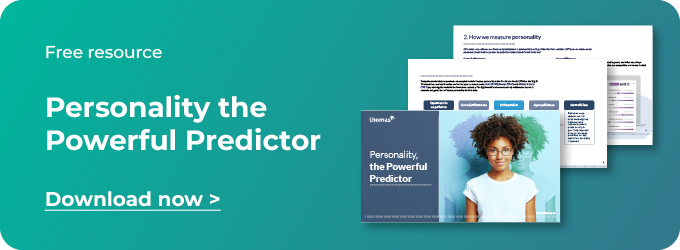You may have heard of people having a “Type A personality” but what about those who are Type B? It’s unlikely that you’ve heard of this term, but what about, “they are the laid back kind of person”? Then that’s more likely as you will know someone - if you’re not laid back yourself - who meets that description.
Understanding the Type B personality along with the other three types is key to understanding behaviour and how when managed effectively, you can get the best out of the person and even understand certain workplace behaviours which without any prior knowledge may appear to be difficult to comprehend.
Today we are going to take a look at the Type B personality and build our understanding in more detail what it means to have a Type B personality. We will get a better understanding of the impact of this behaviour and why understanding this personality type is important in the recruitment process. Finally we will discuss how the Thomas range of tools can help you find out what personality type your candidate has.
What is the Type B personality type?
Type B personalities can be generally summarised as; easy going, relaxed and highly-flexible. Generally taking a much more carefree approach and wider philosophical view of themselves, work/life balance and other traits which make them less stressed and more widely appreciated when compared to Type A personalities.
When discussing Type B personalities, you can get carried away with descriptions that would depict someone as being lazy or not interested in doing the work, but that’s not accurate. Being laid back at work can be a sign of how Type B personalities are actually thinking more about bigger picture scenarios or even trying to find different solutions by involving themselves amongst others to create a better working environment. When managed correctly, Type B personalities can be strong allies within the company, creating better working relationships and being more flexible with new approaches rather than tired systems.
Type B personalities are very outgoing, energetic, and fast-paced individuals who like to be around people and generally enjoy being the centre of attention. One of the main differences with Type A personalities is that Type B personalities thrive on communication with other people and need validation not from their work, but on the relationships that they hold. Compliments, acknowledging their achievements and even public appreciation holds more value with Type B personalities than with other types.
How Type B personality differs from Type A
If Type B personalities are seen as easy-going, relaxed and highly flexible, Type A personalities are seen as more meticulous and high maintenance, being competitive as well as placing worth in their achievements. They are in short, very contrasting personalities.

What it means to have a Type B personality
We have seen what the basic identifiers are when it comes to Type B personalities, but let’s now take a closer look at what it means to be Type B.
Flexibility
This can be concerned with their own time, other people’s time or even with the way that they work - completely forgoing what has been used in the past to try something new and untested.
Low stress levels
In comparison to Type A personalities, low stress levels are a huge indicator of a Type B personality. In fact, it’s how the two personality groups were first identified, all thanks to a cardiologists waiting room where Type A patients wore out the seats and carpet whilst Type B didn’t.
Relaxed attitude
This obviously helps keep stress levels reduced but there are other elements to this relaxed attitude. This can be both positive and negative especially depending on the industry you work in.
Adaptability to change
Again, flexibility is the key here. There is nothing that a Type B personality won’t try to either make others happy or because they want to see how it works. They are not concerned with failing in the aim to see something succeed.
Even-tempered
This balanced approach is what makes Type B personalities so likeable. They are not going to be prone to lashing out, instead, finding common ground with many different people.
Laid-back
Sometimes, that relaxed attitude and even-tempered nature of a Type B personality can be very relaxed. Being laid back can allow others to feel comfortable in your presence but also not work as hard if you were in a management position.
Tendency to procrastinate
One of the key takeaways is that Type B personalities can have a tendency to procrastinate. This can be due to the fact that they are more laid back and even tempered but also, paying attention to details is not a strong suit.
Creativity
Type B personalities are known as dreamers, being able to see or have a vision that can be then executed. They spend a lot of time thinking of solutions, ideas, products to create something new and exciting. They are very philosophical about the process and find peace working in these creative environments.
How Type B personalities can impact behaviour in the workplace
Naturally, having any of the four personality types will impact behaviour in the workplace. Understanding the Type A personality you will better understand that the impact can be positive or negative depending on certain triggers and even the types of work that each individual does.
Do you have a team that responds well to well established relationships? Do you have team members who work better as part of a team? Then Type B personalities are ideal in these circumstances as they thrive on interactions. However, it needs to be managed as too much interaction from Type B personalities can also be quite distracting - they tend to take over social roles and can be a bit too talkative if not managed correctly.
What kind of workplace environment do you have? What are you fostering or creating as part of the general ambience? Highly stressful workplaces won’t affect Type B personalities as much as Type A. In fact, this is one of the major benefits of Type B personalities with their laid back approach to the way they view work and problems. That doesn’t mean that they won’t get stressed, it just means that they can certainly feel less stressed and in return, potentially make others relax a little more.
And what about changes to work practices or systems? Type B personalities are very flexible in this scenario, their positive attitude and easy-going relationship with change is of benefit in these kinds of workplaces.

How to get the best of out candidates and employees with Type B personality
Understanding you have a Type B personality in your candidates or current employees is a great way to start. Importantly though, what you do to best manage these characteristics is going to be the key to success.
Of course, there are positive and negative characteristics of this personality type so how you manage them is important.
People pleasers
Understanding that Type B personalities are about being people pleasers will give you insight into strengths and weaknesses. They might not be the best team leaders - although they might be - but what they are good at doing is bringing people together to see different perspectives. A negative is that if they are not somehow involved, they can feel left out and in turn created a negativity towards the organisation or hitting targets.
Have big visions
One of the aspects about Type B personalities is that they like to dream big. They are very creative in this way and can spend hours, days, weeks thinking about the right solution. However, this also needs to be managed - they can get easily distracted and focus on these things over more pressing concerns.
Productivity
Finally, one of the key traits that a Type B personality holds is that they can be procrastinators and thus need to be monitored with a bit more care and attention than say a Type A or Type C.
Why understanding the Type B personality type is important in hiring decisions
Whether you’re at the interview stage or you’re looking to laterally promote someone within your organisation, knowing that they have a Type B personality is going to be of strategic value. From understanding a candidate’s suitability for a role, to seeing how they would behave with others in the organisation before even having the job is of course of great value.
How you go about assessing personality is equally important. Using tools like the Thomas suite of assessments will make that process easier.
Type B personalities have lower stress levels and can manage ever changing situations with greater ease than say someone who requires maximum steadiness throughout their day. Being able to use these skill sets in a high stress environment can be of benefit, especially with those in the business who may struggle with this side of the work/life balance.
Furthermore, Type B personalities know how to get others to see their point of view. They can build strong relationships and this can be of great benefit to many within the business, especially those driving change.
One of the things that you would need to manage early on would be elements of procrastination or distractions that can occur with a Type B personality.
In summary
Type B personalities can be generally summarised as; easy going, relaxed and highly-flexible. Type B personalities can be strong allies within the company, creating better working relationships and being more flexible with new approaches rather than tired systems. You would need to manage their tendency to procrastinate and keep in mind that they are also dreamers, taking philosophical views to creative solutions and work.
Thomas’ workplace personality test can be used to help assess and understand a candidates or employee's personality type and wider personality.
Based on the globally recognised and respected 'Big 5' psychological theory, the High Potential Trait Indicator (or HPTI) as we also call it, assesses six core traits (Conscientiousness, Adjustment, Curiosity, Risk Approach, Ambiguity Acceptance and Competitiveness) to help you identify the best candidate for a role and identify leadership potential, adding confidence to your recruitment.
If you would like to learn more about our assessments, please speak to one of our team.





